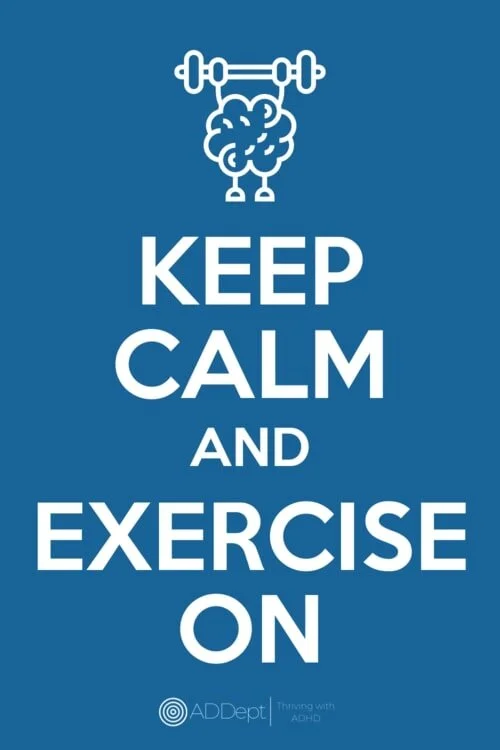Sure, we all know we should exercise. We know it’s good for our heart, it keeps our weight down and makes us stronger. But all those things? They’re all long-term benefits that, if we’re honest, don’t do much for ADHD brains. ADHD brains want rewards that are immediate and strong and don’t take too much energy.
But, what if I told you that exercise can actually give your brain a much-needed boost? That it can increase your focus, help you learn, and make you happier? What if I told you that almost every struggle that ADHD creates for your brain is targeted and improved directly from exercise? And what if I told you that you can feel all those things both immediately and in the long term? Does that increase your motivation?
No?
Yeah, ok- I get it. Exercise takes energy and effort and planning- all of which are hurdles on your path, blocking not only your momentum but also your vision of that sweet reward on the other side.
One of my favorite ways to get over these hurdles is really examining the why. That big motivating factor whose energy can push you up and over the obstacles that stand in your way and draw you to that oh-so gratifying finish-line.
So my first challenge to you is to ask exactly that: Why? Why would you exercise? What will that sweat session really do for you and how, exactly, does it do it?
Don’t worry- I’m not going to make you hunt down those answers on your own- I’ve got you covered. Let’s dive in and uncover the transformative effect of exercise on our big, beautiful and complex brains:
12 Ways Exercise Helps Boost your ADHD Brain
Exercise decreases stress and anxiety at the moment.
Exercise causes a flood of GABA (termed the anti-anxiety molecule) to enter your brain. Its purpose during exercise is to keep your brain from overreacting to the stimulation that happens to it during exercise. That’s great. But the awesome side effect of this flood of GABA is that it mellows out that big ole stress/ anxiety ball that you grasping so tightly right before you set out on your run (or walk, or dance break or power vacuuming sesh).
2. Exercise decreases your startle response and evens out your reactions
At the very base of our brain is a section called the brain stem- this holds the brain structures responsible for our most primitive and basic functions like sleeping, eating and heart rate. Exercise has a particular effect on one of these structures- the locus coeruleus- which is responsible for arousal (how awake you are). The more you exercise the stronger- more toned- it becomes. This means that it is less likely to startle and react out of proportion to an event. So, the sudden dog bark or the sound of the kids fighting won’t cause your heart to race and your head to spin.
3. Exercise increases your ability to handle stress and emotional overwhelm.
Because exercise triggers a neurobiological fight/flight response without the actual emergency, it trains your brain to figure out the difference between real and imagined stress. In fact, exercise actually grows neurons in your ventral hippocampus (the area responsible for handling stress and emotional processing) which causes it to be more efficient and less reactive. This makes it easier for you to handle stressful situations and not as likely to overreact to emotional events.
4. Exercise gives your rational thinking a boost.
Exercise increases the oxygen saturation and angiogenesis (blood vessel growth) and floods your brain with dopamine. All of these things increase the clarity and rationality of your thinking. Combine that with an increased ability to handle stress and overwhelm and you are now much more able to switch lanes rather than get into a game of chicken with that obnoxious driver sitting on your rear bumper.
5. Exercise increases your ability to shift attention smoothly
You know how it can feel like it takes herculean strength to pull your attention away from one thing (usually something super fun or high pressured) but other times it jerks away from task to task despite your intention to stay in one place? Of course you do! It’s one of the hallmarks of ADHD. This is, in part, the result of an inefficient basal ganglia, which is in charge of shifting your attention. Exercise acts like "transmission fluid” for the basal ganglia- creating a smooth, efficient shifting when you need it and not when you don’t.
6. Exercise helps you tune into what is
important.
When our brains are flooded by all that great dopamine and norepinephrine of exercise, the “signal to noise” ratio of our brain is improved. The norepinephrine tells our brains what to pay attention to while the dopamine drowns out all the rest. So your boss’s lecture can come into focus and you can finally let that itchy tag rest.
7. Exercise increases focus and reaction time
Exercise floods your brain with a powerful cocktail of neurotransmitters- serotonin, dopamine and noradrenaline. This hyperstimulation causes a peak in attention, focus and reaction time. So, you can actually listen to your partner talk about their day and catch your kid slipping off his chair before he hits the ground all without a breaking a sweat.
8. Exercise increases your social and intellectual performance.
Got a big interview coming up? Need to be at your best- working the room and showing off all you’ve got? Hit the gym first. All that oxygen saturation and angiogenesis that increases your rational thinking- it has the same good news for your social and intellectual performance. The increased activity and growth that comes from getting your heart rate up helps you win friends and influence people with both your winning personality and your dazzling brain.
9. Exercise helps your brain protect against neurodegenerative disease
Not so fun fact: The ADHD brain is 3 times more likely to acquire neurodegenerative diseases like dementia and multiple sclerosis as it ages. But, while exercise can’t assure a future free from cognitive disease, it can give you a better shot at coping with them and living a meaningful life despite them. Think of exercise as a supercheap 401K plan- you are going to get old at some point- how much you put away, now? That’s what allows you to make the most of it.
10. Exercise helps you remember where you put your keys
Exercise increases neuronal growth (and therefore the size) of the anterior hippocampus. This area is responsible for spatial memory (where things are, memories of where things happened etc.). So when you exercise you beef up this area and make it easier for your brain to actually remember where you put your keys.
11. Exercise improves mood
Remember that supercharged cocktail? Dopamine, Noradrenaline and Serotonin? The 3 musketeers of happy brains- they all combine to give you that “all is well with the world” feeling after a good workout. Now, this feeling won’t last forever. But you know the really cool thing? If you work out regularly it starts to last longer. And regular exercise makes your brain build more receptors for all those extra neurotransmitters which keeps up the good feelings long term. In fact, a recent study by Harvey et al (2018) with 33908 participants in sweden, concluded that just 1 hour of exercise a week can mitigate depression.
12. Exercise helps you learn
New research shows that when we exercise, our brains produce a special protein- BDNF- that’s responsible for helping learning. This protein unlocks the door to greater learning. Not only are our brains more able to learn more motor skills but they can also learn new information. So, have a big test coming up? Hit the gym before each study session- you might be amazed at what you can learn!
So, now you have 12 power-packed why’s. Choose one that means the most, or grab a couple- hell, take the whole list! But, whatever you do, let the why’s and the how’s propel you into action. Get your body moving and and see what it can do for your brain.
What’s your reason for exercising? What keeps you motivated?
Ready to shift from
meltdown to mastery?
This online course has been designed specifically to help teach the strategies ADHD brains need to help them move from overwhelm and meltdowns to confident emotional mastery.
Want to know more about
thriving with ADHD?
Check out these other articles:













How to Beat the Winter Blues: Tips for ADHD and Seasonal Affective Disorder